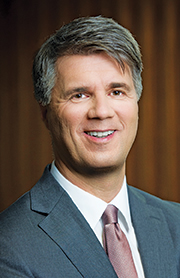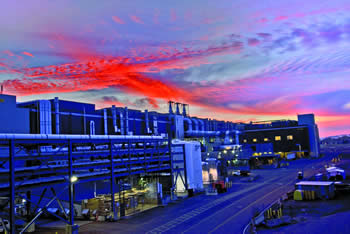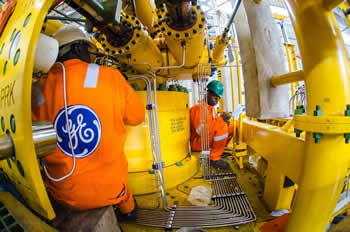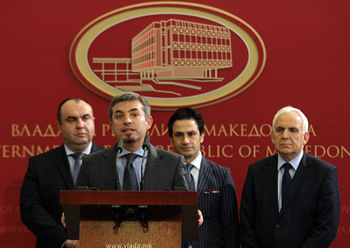Vehicles, energy, high-tech and Elon Musk dominate Site Selection’s annual Top Deals of the Year and Honorable Mentions for North America and internationally, based on our tracking of private-sector facility investment projects around the world during the 2014 calendar year.
Top Deals projects, highlighted here in alphabetical order by company name, are selected based on indexing of capital investment and job creation totals, with consideration of such factors as competition for the project, regional economic impact (including per-capita analysis) and obstacles/challenges overcome.
Following are summaries of the Top Deals in North America and Top International Deals, followed by North America Honorable Mentions and International Honorable Mentions.
NORTH AMERICA TOP DEALS
Alevo
Concord, N.C.
$1 billion 2,500 jobs
Switzerland’s Alevo Group uses a combination of innovative battery technology and smart data analytics “to reduce a substantial part of the 30 percent of generated electricity that is currently wasted through reducible inefficiencies.” In October, Alevo announced it would deploy and commission production lines at Victory Industrial Park (VIP) in Concord, N.C. — a property formerly known as the 2,000-acre Philip Morris cigarette manufacturing campus, which Alevo purchased for $68.5 million. No incentives were requested nor granted.
The Alevo VIP manufacturing plant will create 500 jobs in the first 12 months making the company’s lithium cell GridBank battery storage technology, which fits inside shipping containers for use by utilities. The job total will rise to 2,500 skilled jobs (the same number once employed there by Philip Morris) within three years as manufacturing lines are added, “ultimately rising to 6,000 jobs if and when additional manufacturing elements are located at the plant,” said the company.

BMW
San Luis Potosi, Mexico
$1 billion 1,500 jobs
One of several major investments to recently choose Mexico (see p. 24), BMW’s project was announced in July. Full production is planned to start in 2019.
According to BMW, “the large number of international free trade agreements — within the NAFTA area, with the European Union and the MERCOSUR member states, for example — was a decisive factor in the choice of location. … Other crucial advantages were the highly qualified local workforce, a solid network of established suppliers and the well-developed infrastructure,” said the company.
Giti Tire
Richburg, S.C.
$560 million 1,700 jobs
This project was one part of a landmark day in South Carolina’s economic development history, as June 16 saw three companies — Giti, LPL Financial and Lash Group — announce projects involving a cumulative 3,900 new jobs for the state. Expected to be operational in 2017 and produce 5 million tires annually, Giti’s first North American plant broke ground in February 2015 at the Carolinas I-77 Mega Site in Chester County, just south of the Charlotte metro area. The technical college system, proximity to major transportation infrastructure and deepwater port facilities in Charleston, market access to the growing Southeast region and the state’s business-friendly environment were among the factors driving the location decision. The state’s readySC team is assisting the company with the recruiting and training of its initial workforce.
The deal took on national political dimension when South Carolina Gov. Nikki Haley complained on Giti’s behalf to the federal government because of new tariffs of 17.69 percent levied by the US Dept. of Commerce on tires manufactured in China — including tires made at seven Giti plants. Giti saw its onerous tariff lowered in December 2014, when the US Dept. of Commerce cited errors in its calculations.
Northrop Grumman
Melbourne, Fla.
$500 million 1,800 jobs
As Florida Today’s blow-by-blow account of “Project Magellan” reported in May 2014, Brevard County, due to lack of space, originally was spiked from consideration for a larger-scale project called “Project Bullet” that would have created nearly twice as many jobs, but came back on Northrop Grumman’s radar for this still-huge investment in manufacturing the next-generation B-2 stealth bomber aircraft. Negotiations were tense and extensive over a two-year period, and involved the office of Gov. Rick Scott (which deployed $20.9 million from the state’s Quick Action Closing Fund, after approval by the state legislature), Enterprise Florida, CareerSource Florida, Space Florida, the EDC of Florida’s Space Coast, the county, the City of Melbourne and Melbourne International Airport.
The project landed one year after the company designated its five US centers of excellence, two of which are in Florida: the Manned Aircraft Design Center of Excellence in Melbourne and the Aircraft Integration Center of Excellence in St. Augustine. That designation brought 1,000 new jobs to the two centers.
Renault-Nissan Alliance/Daimler
Aguascalientes, Mexico
$1.4 billion 5,700 jobs
In June 2014, Renault-Nissan CEO Carlos Ghosn and Daimler CEO Dieter Zetsche announced that their companies had agreed to establish a 50:50 joint venture that will oversee construction and operation of a new plant in Aguascalientes in north-central Mexico, near an existing Nissan plant, that will have an annual capacity of 300,000 vehicles when fully ramped up in 2021. Start of production is planned for 2017 with Infiniti models. The production of Mercedes-Benz brand vehicles will follow in 2018.
The project follows the November 2013 launch of Nissan’s new US$2 billion manufacturing complex in Aguascalientes — the latest of three assembly facilities, which increased Nissan’s total output in Mexico to more than 850,000 vehicles annually.
Shandong Tranlin Paper
Richmond, Va.
$2 billion 2,000 jobs
The largest Chinese greenfield economic development project in the United States was announced by Virginia Gov. Terry McAuliffe in June 2014. The pulp and paper giant will not only make paper, but also fertilizer. Use of agricultural residuals from area farmers could benefit those farmers to the tune of $50 million annually.
“Virginia has abundant resources of agricultural stalks, power and water supply, manpower, and a strong transportation system — all necessary tools that guarantee Tranlin’s future development,” said Hongfa Li, chairman and president, Shandong Tranlin Paper Co., Ltd. “More importantly, the Virginia team’s flexibility, patience, teamwork, cooperation, and above all, passion for foreign investment, factored into our decision.” Jerry Z Peng, chairman and CEO of Tranlin’s US entity, received his MBA from the University of Virginia’s Darden School and currently serves on its foundation board.
SolarCity
Buffalo, N.Y.
$5 billion 1,450 jobs
This California company, chaired by Tesla and SpaceX founder Elon Musk, in September 2014 broke ground at the former Republic Steel manufacturing site in South Buffalo for what will eventually be the largest solar panel manufacturing complex in the Western Hemisphere, after acquiring Silevo in June. The SolarCity GigaFactory will have annual capacity of 1 gigawatt and will create more than 3,000 jobs in the region and 5,000 jobs statewide. “This is bigger than anything we could have imagined,” said New York Gov. Andrew Cuomo.
The factory will be located at the Buffalo High-Tech Manufacturing Innovation Hub at RiverBend, a new START-UP NY site. Christopher Beitel, executive vice president of global operations and planning at Silevo, told Site Selection his team evaluated ramping up from a Chinese pilot plant or coming to the US. Arizona and New Mexico were finalist territories. “With additional negotiation and potential assistance from the state, you can’t find a location with lower-cost electricity,” Beitel said of the hydropower advantages in Western New York.
Tesla
Reno, Nev.
$4 billion 6,500 jobs
The other Musk-backed Gigafactory of 2014 was this advanced battery manufacturing project, which will contain $4 billion worth of equipment and is estimated to have a $100-billion economic impact on the state of Nevada over the next 20 years. The 6,500 jobs will carry an average wage of more than $25 per hour. The state offered an incentive package worth $1.25 billion.
“Nevada competed against other states for the gigafactory site, including California, Arizona, New Mexico and Texas,” reported Site Selection Senior Editor Patty Rasmussen. “The City of Tucson went so far as to prepare a $3-billion building permit for Tesla, while the lame-duck governor of Texas, Rick Perry, drove to California in a Tesla Model S in order to tout his state’s friendly economic climate. All offered rich incentive packages, one of which Musk claimed was bigger than the one ultimately put forth from Nevada.”
“It wasn’t just about incentives,” Musk said. “What the people of Nevada have created is a state that’s very agile. It’s a ‘get things done’ state.”
Toyota
Plano, Texas
$350 million 4,000 jobs
In April 2014, Toyota announced that it would establish a new headquarters in Plano for its North American operations, where it will unite HQs from its manufacturing, sales and marketing, corporate operations and finance arms.
“With our major North American business affiliates and leaders together in one location for the first time, we will be better equipped to speed decision making, share best practices, and leverage the combined strength of our employees,” said Jim Lentz, Toyota’s CEO for North America.
Toyota started with 100 candidate areas. AP reports in September revealed that Plano beat out Charlotte and two other unnamed finalists for the project, even though North Carolina’s incentives offer was twice that offered in Texas. A Toyota spokesman identified time zone and transportation as crucial factors, including the fact that DFW International Airport, unlike Charlotte Douglas International Airport, offers direct flights to Tokyo.
Volkswagen
Chattanooga, Tenn.
$600 million 2,000 jobs
In an odd but ultimately celebratory sequence of events, on July 10, despite a close vote earlier in the year against establishing a UAW local at the Volkswagen plant in Chattanooga, the UAW established one anyway, announcing the formation of UAW Local 42, and renewing requests for the State of Tennessee to extend the economic incentives necessary for VW to add a new product line at the Chattanooga plant. Four days later, and state and VW obliged, with the company also committing to establish for the first time a 200-engineer National Research & Development and Planning Center of the Volkswagen Group of America, and a $12-million welcome center downtown.
Some elected officials in Tennessee had threatened in February that a successful union vote should be accompanied by withdrawal of state incentives (some $300 million) for VW’s growth in the state. VW is known for its collaboration with works councils in Germany and abroad, and had expressed no objection to the UAW activity. VW says the State of Tennessee can expect estimated additional receipts of about US$12 billion as a result of the Chattanooga plant over a period of about 30 years.
A Class By Itself

One of Site Selection’s criteria for Top Deals analysis is competition for the project. But sometimes “no contest” scenarios merit special mention.
Such is the case in Hillsboro, Ore., with Intel Corp., where the latest Strategic Investment Program (SIP) agreement approved in September 2014 by the Oregon Business Development Commission guarantees a tax structure over the next 30 years for up to $100 billion of investment by Intel. A 2012 SIP, still in effect, does the same thing for 15 years and up to $25 billion in investment.
The premise for the SIP program goes back to the mid-1990s, as Oregon leaders saw their competitive advantage wilting in the silicon/semiconductor field they’d cultivated since the 1970s arrivals of major operations from such firms as Intel and Wacker Siltronic.
Mark Clemons, economic director for the City of Hillsboro, helped put together the SIP approach, which is targeted toward capital-intensive industries where individual pieces of equipment can cost anywhere from $6 million to $60 million.
“For Oregon to continue to be competitive in this industry, we needed to change our tax system,” says Clemons, essentially capping taxable value at $100 million with the SIP, first deployed in an initial agreement with Intel in the mid-1990s. “It was put in place for capital-intensive industries. Because they are such high numbers, you can make a pretty good case for why this program makes sense.” — Adam Bruns
INTERNATIONAL TOP DEALS
General Electric
Calabar, Nigeria
$250 million, 2,300 jobs

The development of multimodal manufacturing hub, part of GE’s $1-billion commitment in Nigeria, will take three years to complete in Calabar, a trading port that was the nation’s first capital city. “With contracts recently inked, the transformation of Calabar into the power, oil and gas supply hub for West Africa is becoming a reality,” says GE. Julius Berger Nigeria Plc, the preferred bidder to build the state-of-the-art facility, will also build an on-site facility for GE where repair engineers, welders, fabricators and machinists will be trained.
GE has committed to spend an additional $800 million over the next five years in local sourcing of goods, services, labor, staff welfare and training. Just prior to the groundbreaking, Nigeria’s Minister of Petroleum Resources Deziani Allison Madueke “reaffirmed the current administration’s commitment to attracting foreign direct investments to the nation, by providing an environment where businesses and investments can thrive.”
Hon Hai/Innolux
Kaohsiung, Taiwan
$2.6 billion, 2,300 jobs
Foxconn parent company Hon Hai and affiliate Innolux Display Corp., a maker of thin film transistor-liquid crystal display (TFT-LCD) panels in Taiwan, signed an investment letter of intent (LOI) to jointly invest in a sixth-generation (6G) low temperature poly-silicon (LTPS) TFT-LCD panel plant in the Kaohsiung Science Park (formerly STSP Luchu Base) in southern Taiwan. According to Foxconn Chairman Terry Gou, Hon Hai’s the plant will be a milestone for Hon Hai Group’s transformation, and help this subsector in Taiwan pull ahead of Japanese and Korean rivals, said press accounts, especially in the manufacture of cellphone panels.
At the press conference, Gou also announced Hon Hai would recruit some 3,000 engineers for a project in the Kaohsiung Software Technology Park (KSTP) “for building into a world-class data center.”
Hon Hai Precision
Heze, Shandong Province, China
$2 billion, 4,000 jobs
Even as the Taiwanese plant was moving forward, demand from customers such as Apple was driving Hon Hai to set up this project in eastern China’s Shandong province. According to the Shandong-based Economic Observer, Foxconn and the Heze city government came to an agreement in late August. The report said Foxconn in 2011 launched an effort to install 1 million robotic arms at its Chinese factories within three years, but that “due to technical and cost issues, there are fewer than 100,000 robotic arms in operation and the manufacturer is still greatly reliant on its human workforce.” The report also said Heze, a city of just under 1 million, sees about 20 percent of its population leave to work in other cities every year.
Honda Cars India
Tapukara, Rajasthan, India
$567 million, 3,200 jobs
In February 2014, Honda Cars India Limited (HCIL), Honda’s automobile manufacturing and distribution company in India, started the production of cars from this plant, beginning with the Honda Amaze model. The HCIL plant, an integrated complex spread over 450 acres, is the first car manufacturing plant in the state of Rajasthan, and has a capacity of 120,000 vehicles annually.
“India is an important market for Honda, and with the beginning of car production at Tapukara plant, we are advancing our commitment to expand Honda’s business in India,” said Yoshiyuki Matsumoto, managing officer, Honda Motor Co. Ltd., Japan and Representative of Development, Purchasing and Production in Asia & Oceania Region. “We are thankful to the Government of Rajasthan for extending all the support to participate in the industrialization of the state. Through our products and operations, our goal is to make Honda a company that society wants to exist.”
Intel
Kiryat Gat, Israel
$6 billion, 1,000 jobs
In September, Israel’s Ministries of Economy and Finance approved Intel’s investment program, the largest in the history of the State of Israel. In addition to the announced investment and 1,000 jobs, the plant upgrade will spur the hire of an additional 2,500 indirect employees. Intel is committed to a reciprocal purchase in Israel of an aggregate total of around $550 million, and additional local purchases of around $46 million annually. Intel also committed to employing most of its workforce from southern Israel.
As part of the approval, Intel will be given special preferred enterprise status, which grants Intel eligibility for 5-percent corporate tax over a period of 10 years (until 2023), and grants of $300 million to be spread over five years. “For the first time, the State has determined clear criteria which will be constantly reviewed throughout the eligibility period,” said the announcement from the Israeli government, including increasing export capacity, standing firm on employment targets, increasing local purchasing targets, and investing in academic research and student tuitions to the tune of at least $1 million annually.
Intel already employs more than 9,900 in Israel at four R&D sites and two fabrication facilities.
“An investment of $6 billion, jobs for thousands of Israelis, and future income of millions of dollars from taxation makes is indeed tremendous news for the Israeli economy, which is beginning the new year with a giant step forward and positioning Israel as an attractive investment destination by international criteria,” said Minister of the Economy Naftali Bennett.
PT Honda Prospect Motor
Karawang, West Java, Indonesia
$262 million, 3,900 jobs
Anyone visiting Southeast Asia for the first time marvels at the number of motorcycles on the roads, and Honda Prospect Motor plans to keep fulfilling that demand. This plant opened in January 2014, as the company aims to sell 300,000 units a year in Indonesia alone by 2016. That’s not the only large number accruing to the territory’s benefit: With the start of this second factory’s operation, the number of local suppliers for HPM has increased from 100 to 145 companies.
In December 2014, PT Astra Honda Motor (AHJ) announced a new production line with annual production capacity of 500,000 units, for the manufacture of sports motorcycles, to be built within the property of AHJ’s existing Karawang Plant in the Bukit Indah Industrial Park, about 70 km. (43 miles) east of central Jakarta. The $142-million investment will mean another 1,500 new jobs by the end of 2015, when AHJ’s four plants will have annual production capacity of 5.8 million units (1.6 million in Karawang). For 2014, industry-wide motorcycle sales in Indonesia were expected to be approximately 8 million units, and AHJ’s sales were expected to exceed 5 million units.
Renault/Dongfeng
Wuhan, China
$1.2 billion, 2,000 jobs
In December, one year after the creation of Dongfeng Renault Automotive Company (DRAC), Renault was on target to launch its first locally manufactured vehicle in China in 2016. “The synergies offered by Dongfeng and Nissan, present in China for ten years running, have buoyed the project in terms of both the building of the plant and manufacturing, promising increased speed and lower costs,” said the company. “The Wuhan region boasts a particularly dense network of suppliers, resulting in a high local content rate from the outset.”
SunEdison/Adani Enterprises
Mundra, India
$4 billion, 4,500 jobs

Adani, already India’s biggest power generation company and biggest owner of ports, now aims to be its leading energy titan too. In addition to this project in Gujarat that will create India’s largest solar PV manufacturing complex, the company also now has linked up with Australia’s Woodside Energy for oil & gas projects. The solar project joins other renewable energy projects in the state from Indian wind power giants Suzlon and Welspun Renewables.
“The facility will manufacture solar panels to fuel solar power growth in India, furthering India’s goals for clean, renewable energy independence, and will add up to 20,000 jobs to the local economy,” Adani and SunEdison said in a joint statement. The independence will be from Chinese-made equipment that has flooded the Indian market. It’s in keeping with Prime Minister Nohendra Modi’s “Make in India” campaign. “This facility will create ultra-low cost solar panels that will enable us to produce electricity so cost effectively it can compete head to head, unsubsidized and without incentives, with fossil fuels,” said Ahmad Chatila, president and CEO of SunEdison, which separately has announced a microgrid partnership in India that it hopes will provide electricity to 10 million people during the next five years.
Volkswagen
Wrzesnia (Poznań), Poland
$1.1 billion, 3,000 jobs
VW and government officials in November 2014 laid the foundation stone for this new plant, which will manufacture the Volkswagen Crafter by the end of 2016. “As a result of this investment the workforce of the Volkswagen Group in Poland will grow to over 16,000 employees in the next few years,” said Dr Leif Östling, member of the board of management of Volkswagen AG with responsibility for commercial vehicles. “This will increase the importance of Poland as an international automobile location.”
Jens Ocksen, Chairman of the Board of Management of Volkswagen Poznań, stressed the production, logistics, workforce and supplier advantages of locating the new plant in the vicinity of the existing plant in Poznań, which has been in operation for 20 years. “Września offers us the best economic, infrastructural and labor market conditions,” he said.
“Locating the Volkswagen project in Poland is proof that Poland remains an attractive location for investment,” said Janusz Piechociński, Poland’s deputy prime minister and minister for economic affairs. “The foundation stone ceremony today is also the start, I hope, of long-term prospects for local companies which can provide high-quality services.”
Weibo Group
Macedonia
$180 million, 5,000 jobs

Turkey’s Weibo Group announced this textiles manufacturing project in April 2014 after nearly six months of evaluation of candidate sites and negotiations with Macedonian government officials, including Prime Minister Nikola Gruevski, who after visiting in China with company officials later in the year said Weibo also plans to open more plants related to the steel industry. Weibo currently employs 14,400 people in factories in China, Cambodia and Turkey, with 13,650 of them working at seven sites in China and Cambodia.
The project is taking shape in Selçuk Alperen Weibo Industrial Zone, which the country bills as “Europe’s largest Integrated Textile and Ready-to-Wear Industrial Zone” in the northeast region of Macedonia. The initial construction area will encompass 240,000 sq. m. (2.6 million sq. ft.) on a 400,000-sq.-m. (4.3-million-sq.-ft.) site. Total investment is expected to climb to $400 million in five years, enabling exports to North America, Europe and Asia worth up to $800 million from a new “textile city.”
